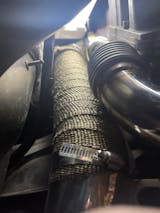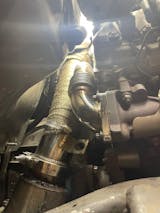
Diesel Particulate Filter Problems: The 5 Most Common Symptoms
Is your diesel truck losing power or showing warning lights? You could be facing diesel particulate filter problems. A clogged DPF filter reduces performance, hurts fuel economy, and leads to expensive repairs. This guide reveals the 5 most common symptoms of a blocked particulate filter, explains how to diagnose issues, and provides solutions—from forced regeneration to replacement options. Keep your truck running strong and avoid costly downtime.
What is a DPF and Why Do Problems Occur?
The Diesel Particulate Filter (DPF) traps soot and ash from exhaust gases to reduce emissions. Over time, incomplete regeneration cycles, short trips, and lowquality fuel cause blocked DPF filter issues. Common causes include:
- Excessive soot loading from city driving
- Ash accumulation (nonburnable byproduct from oil and fuel additives)
- Faulty sensors (differential pressure, temperature)
- Low exhaust temperatures preventing regeneration
The 5 Most Common Diesel Particulate Filter Problems
1. Loss of Power and Reduced Performance
- Symptoms: Sluggish acceleration, lack of power when climbing hills, reduced towing capacity
- Cause: Blocked particulate filter creating excessive exhaust backpressure
- Solution: Perform forced regeneration; if unsuccessful, clean or replace DPF
2. Frequent Regeneration Cycles
- Symptoms: Burning smell from underhood, cooling fans running after shutdown, increased fuel consumption during regeneration
- Cause: Clogged DPF filter requiring more frequent cleaning cycles
- Solution: Check for underlying issues preventing proper regeneration; diagnose sensors
3. Warning Lights and Error Codes
Common Dash Lights: DPF warning light, check engine light, reduced power warning
Related Trouble Codes:
- P2002: DPF efficiency below threshold
- P2463: DPF restriction soot accumulation
- P242F: DPF restriction ash accumulation
Solution: Use OBD2 scanner to read codes; address specific issues
4. Poor Fuel Economy
- Symptoms: MPG drops by 2030%, more frequent fuel stops
- Cause: Diesel particulate filter problems forcing more regeneration cycles that consume extra fuel
- Solution: Address regeneration issues; consider DPF cleaning or replacement
5. Failed Emissions Tests
- Symptoms: High smoke opacity readings, visual smoke from exhaust
- Cause: Blocked DPF filter unable to trap particulate matter effectively
- Solution: Professional DPF cleaning or replacement; ensure proper regeneration
How to Diagnose DPF Problems
Follow these steps to confirm clogged DPF filter issues:
1. Scan for Codes:
Use a professional OBD2 scanner to read DPFspecific codes
2. Check Differential Pressure:
Monitor pressure readings across the DPF (high pressure indicates blockage)
3. Visual Inspection:
Look for soot deposits around exhaust connections
4. Performance Test:
Note power loss characteristics during acceleration
Solutions for Diesel Particulate Filter Problems
Forced Regeneration
- Process: Using dealership or aftermarket tools to initiate active regeneration
- When Effective: For mild to moderate soot loading issues
Professional DPF Cleaning
- Process: Specialized cleaning using thermal, chemical, or ultrasonic methods
- When Effective: For moderately blocked particulate filter with ash accumulation
DPF Replacement
- Process: Installing new OEM or aftermarket diesel particulate filter
- When Necessary: For cracked filters, meltdown damage, or severe ash loading
DPF Delete Kits (OffRoad Use Only)
- Process: Removing DPF and reprogramming ECU
- Considerations: Illegal for onroad use; voides warranty; check local regulations
For DPF delete kits and cleaning solutions, visit www.trucktok.com for reliable options and expert advice.

How to Avoid DPF Problems: Prevention Tips
1. Drive for Regeneration:
Regularly drive at highway speeds for 2030 minutes to allow passive regeneration
2. Use Quality Fuel:
Purchase diesel from reputable stations; avoid biodiesel blends above 20%
3. Change Oil Properly:
Use lowash engine oil (API CK4) and follow manufacturer intervals
4. Address Issues Promptly:
Fix engine problems that prevent proper regeneration (faulty injectors, sensors)
5. Consider Additives:
Use DPFcleaning fuel additives designed to lower regeneration temperatures
When to Seek Professional Help
If you experience persistent diesel particulate filter problems despite maintenance efforts, consult a diesel specialist. Severe blockages, repeated warning lights, or power loss may indicate need for professional cleaning or replacement.
FAQs About Diesel Particulate Filter Problems
Q1: Can I clean a DPF myself?
A1: Basic cleaning is possible with specialized kits, but professional cleaning is recommended for thorough ash removal and inspection.
Q2: How long does a DPF typically last?
A2: Most DPFs last 100,000-150,000 miles with proper maintenance. Ash accumulation eventually requires replacement.
Q3: Will a blocked DPF damage my engine?
A3: Yes, severe backpressure can damage turbochargers, exhaust valves, and increase engine wear.
Q4: Are DPF delete kits legal?
A4: No, DPF deletes are illegal for on-road use in all 50 states and can result in significant EPA fines.


